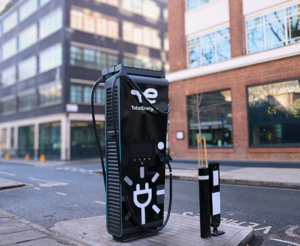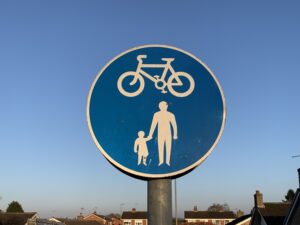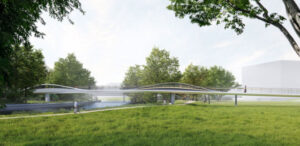Transport for London has published a consultation report that confirms it is moving forward with plans to make it easier and safer to walk and cycle on Battersea Park Road in Nine Elms.
The eastern end of the Nine Elms area has seen significant development in recent years, including a new station on the Northern line, and the changes would help to connect the new and existing neighbourhoods in the west of Nine Elms to London’s growing network of high-quality Cycleways. The changes are being funded by Wandsworth Council and local developers, with funding from both playing an important role in making recently developed areas better places to live for both new and existing residents.
It says the plans for Battersea Park Road will deliver:
- 150m of protected cycle tracks with physical segregation, in response to feedback on earlier designs which had a mix of advisory and mandatory cycle lanes with no physical protection
- Improvements at Queenstown Road junction, including:
- early release on all arms of the junction, so people cycling can move off before general traffic
- dedicated cycle lanes guiding people cycling across the junction going both east and west
- a cycle gate for people cycling eastbound
- New 20mph limits along the whole of Battersea Park Road
- Improved ‘straight across’ pedestrian crossings at the junctions with Queenstown Road and Prince of Wales Drive
- New bus shelters featuring real time bus information for stops serving Battersea Park station
- One-way entry to Meath Street from Battersea Park Road
- Relocation of existing loading and parking arrangements from the main road to side roads
TfL explains that feedback from people who responded to the consultation showed that 67% believed the scheme would encourage many or some more people to cycle, with 5% saying the same about walking. The consultation also showed that 60% of respondents strongly supported the proposed new cycling infrastructure the scheme would deliver.
TfL has already published a consultation report for an earlier phase of the scheme east of Pump House Lane, and work is set to begin here in autumn this year. The section between Pump House Lane and Duchess Bridge was completed in September 2021. TfL will continue to work on finalising this next phase of the scheme, west of Duchess Bridge, and work here will follow in autumn 2024, subject to funding. Work to complete the entire scheme will be complete by spring 2026.
Battersea Park Road links directly with the CS8 cycle route, which is in the top five per cent of routes in London with the greatest potential for people to cycle. The proposals on Battersea Park Road will build on recent upgrades to other cycle routes in the area, by connecting the existing Cycleways of CS8 in Battersea to CS5 in Vauxhall, through Nine Elms and onwards to Wandsworth town centre. People walking will benefit from straight across signalised crossings and improved public spaces.
Helen Cansick, TfL’s Head of Healthy Streets Investment, said: “We’re determined to ensure that everyone in London is able to walk and cycle safely and these changes will be an important new addition to the capital’s network of high quality Cycleways, as well as making it easier to walk and cross this busy road. I’d like to thank everyone who took part in the consultation for their feedback and we’ll continue to work on our plans for Nine Elms to ensure people have even better options for accessing the area sustainably and affordably.”
Councillor Clare Fraser, Wandsworth Council Cabinet Member for Transport, said: “These plans help support this key area of Battersea and will provide transport improvements to cycling and bus infrastructure as well as pedestrian crossings. I’m also pleased to see that the whole of Battersea Park Road will be 20mph under this scheme.
“TfL has developed these plans in response to feedback from local residents, businesses and schools, which is crucial to shape the future of our streets. We want better local walking and cycling routes so that people feel confident about choosing more sustainable travel options, which are also healthier and cheaper to use.”
TfL will continue working closely with London’s boroughs to deliver even more walking and cycling infrastructure in the coming years, including on schemes funded by TfL. Since April last year, TfL and boroughs have already delivered six and a half miles (10.6km )of new or upgraded cycle routes and there are a further ten miles (16.4km) in construction. In total, TfL aims to deliver around 25 miles (39km) of new or upgraded cycle routes over the next 18 months, with the support of boroughs. TfL will also start work on pedestrian and cycling improvements at Streatham High Road and Manor Circus.
TfL’s funding agreement with Government has secured £80m per year to be invested in walking and cycling schemes, with a further £69m per year allocated to boroughs. TfL has so far reduced danger at 43 junctions across London as part of its Safer Junctions programme, with work on at a further two locations set to start this year. All locations in the Safer Junctions programme had higher-than-average collision rates and this improvement work is a vital part of TfL’s Vision Zero ambition.
TfL recently launched local engagement on plans to introduce 28km of new 20mph speed limit on its roads within the boroughs of Camden, Islington, Hackney, Haringey and Tower Hamlets. The new speed limits would help to make a large area of London safer and more attractive for people in these communities to live, work and play, encouraging more people out of their cars to walk, cycle and use public transport.
(Picture – TfL)
























